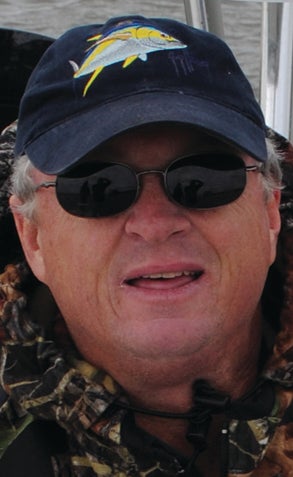DAN KIBLER COLUMN: Guide bemoans missing speckled trout — but loves new push of grey trout, black drum
Noah Lynk of Harkers Island has been guiding fishermen near his home port for decades. He’s seen fish come and go, and over the past handful of years, he’s seen all the speckled trout go, replaced by gray trout and black drum.

Dan Kibler
“I’ve only caught about a dozen nice specks over the past couple of years,” he said. “My trout fishing was phenomenal, then it wasn’t. It all changed four years ago.”
On the other hand, Jerry Dilsaver of Oak Island said the speckled trout fishing in his part of North Carolina’s coast is as good as it’s ever been. A top inshore fisherman who appears at a lot of angling seminars, Dilsaver said, “Any Tom, Dick and Harry can catch a limit of specks where I live. Our local fishermen have had a couple of years of incredible speckled trout fishing. I’ve taken my bike and a couple of rods to a place on the island in the afternoon and caught a limit of fresh specks for dinner real easily.”
What makes the difference? Geography and climate change, said Lynk, who runs Noah’s Ark Charters. He’s fishing relatively close to the beach, in water that’s more influenced by the Atlantic Ocean, and like a lot of anglers from Cape Lookout north, the specks he catches migrate north and south, as far up as Virginia and the mouth of the Chesapeake Bay. Dilsaver’s trout west of Cape Fear — and most of the fish that live in coastal rivers and creeks between Cape Lookout and Cape Fear — are resident fish that change locations only to follow bait and changes in the weather and in water salinity.
“Anybody who doesn’t think there have been any changes is kidding themselves,” Lynk said. “Right now, the water temperature is 10 to 12 degrees off. With this last southerly blow we had, the water temperature on the beach was 55 to 60 degrees; it should have been in the low 40s. The surfers aren’t even wearing gloves.”
Lynk believes those migratory specks that typically hang around Cape Lookout, Atlantic Beach, the North River and Newport River marshes, are farther north, looking for water temperatures more to their liking.
“All my buddies who are guiding up north around Manteo are killing them,” he said. “There are really good numbers up there. The water temperature is right, and there are green-tailed shrimp coming out of the Chesapeake Bay. All the trawlers are catching shrimp coming out of Chesapeake Bay and Delaware Bay.”
Lynk said resident fish are still filling up the Neuse, Trent, Pungo, Bay and Tar rivers, in great numbers because it’s been at least a half-dozen years since there’s been a significant cold-water/cold-stun fish kill during the winter.
“Up here, we haven’t had any winter kills, but they just aren’t here to kill,” Lynk said. “In the fall, the (Cape Lookout) rock jetty used to look like a parking lot. Now, the most boats I’ve seen have been 10 to 12 — and they’re catching gray trout and black drum. I probably won’t run a single trip this winter to the rock jetties.
“Four years ago — and I’ve got video to prove it, our specks went from great to nothing,” Lynk said.
The N.C. Division of Marine Fishermen held “scoping sessions” for the public last year to get ideas for better managing speckled trout. Dilsaver said the state is getting some feedback from federal fisheries managers who are worried that too many fish are being caught off Virginia.
“With the incredible fishing we’ve been having, it’s difficult to tell anybody that they need to lower the limit on trout,” he said.
There has been a silver lining in the speckled trout black cloud for Lynk. Whether or not it has to do with climate change and higher water temperatures, he’s running into plenty of big, gray trout and black drum.
“We are getting big numbers of grays, and big fish, 6 to 8 pounds,” he said. “And the black drum are taking the place of speckled trout. We’ve never had black drum like we’ve had the past 3-4 years. I’m going to be running charters for grays and black drum all winter long.”
Dan Kibler has covered the outdoors since 1985 as outdoors editor of the Winston-Salem Journal and later as managing editor of Carolina Sportsman until his retirement in 2021.

